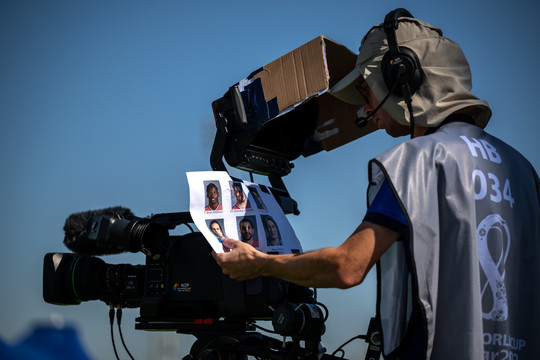The IFJ has listed the latest incidents reported by media workers covering the World Cup in Qatar since the beginning of the event:
On 15 November, a Danish TV2 team was prevented from filming in a public space in Doha, Qatar’s capital. Security officials tried to cover the camera and interrupted the live broadcast, in what constitutes one of the first infringements on media freedom against international journalists accredited to report on the upcoming World Cup. Afterwards, the crew received an apology from the Qatar International Media Office and Qatar Supreme Committee.
On 18 November, Dutch journalist Bas Scharwachter, working for online news media NU.nl, was forced by the police to delete photos that showed security guards and police officers outside the Al Thumama Stadium. He was reporting ahead of the inauguration of the tournament on Sunday, 20th.
On 21 November, US freelance journalist Grant Wahl was briefly detained when trying to enter the Ahmad bin Ali Stadium, wearing a rainbow t-shirt. Later, he received an apology from a security commander and was allowed into the venue.
On 22 November, Danish TV2 Sports reporter Jon Pagh was told to remove his One Love armband by a Qatari official, while getting ready to do a TV report. The crew was filming in the public space, outside the hotel where the Danish national team was hosted. The Qatari authorities apologised.
On 22 November, Brazilian journalist Victor Pereira was harassed by the police and his phone was seized because the flag of the Brazilian state of Pernambuco was mistaken for an LGBTQ pride flag.
On 24 November, Argentinian journalist Joaquín Alvarez and his filming crew were interrupted during a live broadcast by Qatari officials, who claimed that the journalist was filming in a private space. The broadcast was taking place in Barwa Village, a commercial and residential complex on the outskirts of Doha capital. The crew of the program ‘Nosotros a la mañana’ of Canal 13 was forced to leave the area.
Read IFJ 7-points safety advisory that we published to support journalists' and media workers’ covering the World Cup.
IFJ Secretary General Anthony Bellanger said: “Independent reporting is key to transparency around such a global event. We call on the Qatari authorities to make immediate changes to the guidelines on the treatment of journalists, which seems to be driven by suspicion and mistrust. Security personnel cannot continue to obstruct journalists from doing their jobs, and apologise later.”

